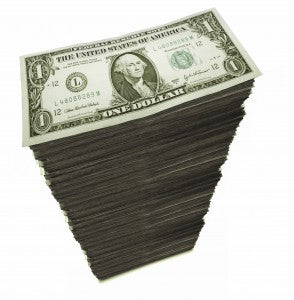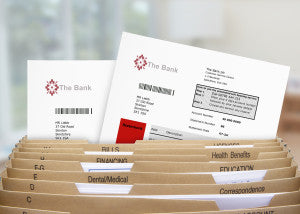
When it comes to preparing for disasters, emergency kits are usually one of the first things people think of. But what about financial preparedness? Sure, being prepared with food, gear, and other necessities is important, but a lot of times, financial preparedness is forgotten. Having a financial first aid kit can bring immediate relief during a financial crisis, much like an emergency kit built for disasters can alleviate issues following natural upheavals.
Why have a financial first aid kit? Well, for starters, emergencies don’t suddenly negate your responsibility to paying bills. How you get that money could very well come from the contents of your financial first aid kid.
Not sure what to put in a financial first aid kit? Check out the official Emergency Financial First Aid Kit checklists and forms from FEMA. For an abbreviated version, keep reading.
- Household Identification
Having proper identification for everyone living in your household (you, spouse, children, etc.) can provide proof when proof is needed. Photo ID such as a copy of a driver’s license or other ID should work. Especially important for children is to have their birth certificate safe in this emergency kit, to prove to any authorities that you are indeed the parent. Social security cards, military service and pet ID tags are also a good idea to keep in this kit.
Having all your household identification documents in one place can help provide proof of household members, maintain or re-establish contact with family members and employers, and even apply for FEMA disaster assistance.
- Financial and Legal Documents
Being able to continue making payment and credit during an emergency is crucial. Certain documents containing housing payments, insurance policies, sources if income, and tax statements are important to have for many reasons. Identifying financial obligations will be much easier with these documents, and you’ll be less likely to forget about something that needs to be paid. Such documents will also help re-establish financial accounts, provide contact information for financial and legal providers, and of course, apply for FEMA disaster assistance.
- Medical Information

Health insurance cards are a must. In the event of a disaster or other emergency, injury is much more likely, and health insurance cards can help you get the medical attention you need. Your physician information and immunization records will also provide doctors with your current medical situation and the information they need to provide proper medical care. Also, if you are currently receiving medical care, this information can ensure it continues uninterrupted.
- Household Contacts
Your contacts are likewise important. Know who to talk to at your bank, as well as how to contact them. Other people to have contact information for would be your insurance agent, health professionals, and service providers. This information will allow you to begin recovery quickly, including contacting utilities about outages and restoration, insurance, and other aspects of recovery.
- Emergency Money
If there’s an extended power outage, ATMs may not work and banks may be closed. Credit and debit cards will likewise be useless. If this is the case, acquiring money for, well, anything could be all but impossible. It’s recommended to have at
least $100 in cash on hand. Make sure your cash is also separated into small bills. During an emergency, people may not have change, in which case a $2.00 bottle of water could cost you $20 or more, depending on your smallest bill denomination. $20 bills should be your highest value, with ones, fives, and tens mixed in.
For forms and checklists for you financial first aid kit, visit FEMA.gov by clicking here.

 When it comes to preparing for disasters, emergency kits are usually one of the first things people think of. But what about financial preparedness? Sure, being prepared with food, gear, and other necessities is important, but a lot of times, financial preparedness is forgotten. Having a financial first aid kit can bring immediate relief during a financial crisis, much like an emergency kit built for disasters can alleviate issues following natural upheavals.
Why have a financial first aid kit? Well, for starters, emergencies don’t suddenly negate your responsibility to paying bills. How you get that money could very well come from the contents of your financial first aid kid.
Not sure what to put in a financial first aid kit? Check out the official Emergency Financial First Aid Kit checklists and forms from FEMA. For an abbreviated version, keep reading.
When it comes to preparing for disasters, emergency kits are usually one of the first things people think of. But what about financial preparedness? Sure, being prepared with food, gear, and other necessities is important, but a lot of times, financial preparedness is forgotten. Having a financial first aid kit can bring immediate relief during a financial crisis, much like an emergency kit built for disasters can alleviate issues following natural upheavals.
Why have a financial first aid kit? Well, for starters, emergencies don’t suddenly negate your responsibility to paying bills. How you get that money could very well come from the contents of your financial first aid kid.
Not sure what to put in a financial first aid kit? Check out the official Emergency Financial First Aid Kit checklists and forms from FEMA. For an abbreviated version, keep reading.
 Health insurance cards are a must. In the event of a disaster or other emergency, injury is much more likely, and health insurance cards can help you get the medical attention you need. Your physician information and immunization records will also provide doctors with your current medical situation and the information they need to provide proper medical care. Also, if you are currently receiving medical care, this information can ensure it continues uninterrupted.
Health insurance cards are a must. In the event of a disaster or other emergency, injury is much more likely, and health insurance cards can help you get the medical attention you need. Your physician information and immunization records will also provide doctors with your current medical situation and the information they need to provide proper medical care. Also, if you are currently receiving medical care, this information can ensure it continues uninterrupted.



2 comments
sundaramoorthy
Thank you a lot for providing individuals with a very spectacular possibility to read critical reviews from this site.
Mike
A very important well written article but In my opinion I would have added a few things I feel were worth mentioning such as water purification tablets as bottled water will be impossible to obtain within a few days and is vital for survival. I would also recommend you start to consider a good water purifier as those tablets will run out and fast. Berkey has the best of the best and is used in 3rd world countries and will basically purify anything you put into it 100% with the filtrated for from memory 10,000 gallons before needing to be replaced. Have people learn the ways of our forefathers and how to hunt, trap and cure meat that can and will literately last for months without needing to be refrigerated as food will be impossibly to find after a real emergency hits us. There are literally thousands of plants and also weeds that most are not aware of that have higher nutritional values than most of the food we eat today so thats a great place to start prepping. You can eat these anywhere you find them at any time and yes, they are all literally around you now if you havent started your own garden of them already. They range from very low sunlight to extreme sunlight needed to extreme droughts as God provided us with these before we had the knowledge and/or capability of preserving foods to last.
There are many more like the necessity for at least 2 fishing polls, a few rolls of fishing line and a decent assortment of different sized hooks as you know where I am going with this one but I am late for an appointment. My last thing which I feel is vital. There are countless peoples today such as the Amish and others who have lived this way for the most part their entire history so if you happen to be fortunate enough to live where there are these communities, LEARN from them. If your not close, maybe you could swing a vacation to any of their locations and lean what they have known forever. It literally can save your live as in all fairness. Once that emergency hits, there will be only a few that will try to help you out of fear of you taking everything they have or at the least, lowering their supplies which equates to them survival chances shortening. Be safe, be careful and be prepared